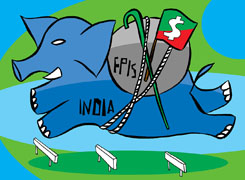Ramalingam Kalirajan |10906 Answers |Ask -Follow
Mutual Funds, Financial Planning Expert - Answered on Apr 25, 2024
He has an MBA in finance from the University of Madras and is a certified financial planner.
He is the director and chief financial planner at Holistic Investment, a Chennai-based firm that offers financial planning and wealth management advice.... more

Thanks you Sir, I am based out in Pune but totally confused how to select a good CFP. Can you please help me in this like where to look for . Also , can you also suggest Mutual Funds which I can invest in on monthly basis and how much. Thank You
Research: Start by researching reputable brokerage firms that offer mutual fund advisory services. Look for firms with a strong track record, experienced financial advisors, and a range of services tailored to your needs.
Consultation: Schedule a consultation with the brokerage firm to discuss your financial goals, risk tolerance, investment preferences, and other relevant factors. This initial meeting will help the advisor understand your needs and recommend suitable investment strategies.
Advisory Services: Once you've selected a brokerage firm, the advisor will work with you to develop a personalized mutual fund investment plan. They will recommend specific funds based on your financial objectives and provide ongoing guidance to help you navigate the market.
Regular Reviews: Schedule periodic reviews with your advisor to assess the performance of your mutual fund investments, review changes in your financial situation, and make any necessary adjustments to your investment strategy.
By following these steps, you can access the expertise of professional brokerages to assist you in financial planning and investment management.
You may like to see similar questions and answers below
Ramalingam Kalirajan |10906 Answers |Ask -Follow
Mutual Funds, Financial Planning Expert - Answered on Apr 11, 2024
Ramalingam Kalirajan |10906 Answers |Ask -Follow
Mutual Funds, Financial Planning Expert - Answered on Jul 10, 2024
Ramalingam Kalirajan |10906 Answers |Ask -Follow
Mutual Funds, Financial Planning Expert - Answered on Jun 28, 2024
Ramalingam Kalirajan |10906 Answers |Ask -Follow
Mutual Funds, Financial Planning Expert - Answered on Aug 24, 2024
Reetika Sharma |432 Answers |Ask -Follow
Financial Planner, MF and Insurance Expert - Answered on Nov 26, 2025
Ramalingam Kalirajan |10906 Answers |Ask -Follow
Mutual Funds, Financial Planning Expert - Answered on Dec 19, 2025
Nayagam P P |10859 Answers |Ask -Follow
Career Counsellor - Answered on Dec 19, 2025
Ramalingam Kalirajan |10906 Answers |Ask -Follow
Mutual Funds, Financial Planning Expert - Answered on Dec 19, 2025
Ramalingam Kalirajan |10906 Answers |Ask -Follow
Mutual Funds, Financial Planning Expert - Answered on Dec 19, 2025
Ramalingam Kalirajan |10906 Answers |Ask -Follow
Mutual Funds, Financial Planning Expert - Answered on Dec 19, 2025
Radheshyam Zanwar |6751 Answers |Ask -Follow
MHT-CET, IIT-JEE, NEET-UG Expert - Answered on Dec 19, 2025
Radheshyam Zanwar |6751 Answers |Ask -Follow
MHT-CET, IIT-JEE, NEET-UG Expert - Answered on Dec 19, 2025
Samraat Jadhav |2514 Answers |Ask -Follow
Stock Market Expert - Answered on Dec 18, 2025
Reetika Sharma |432 Answers |Ask -Follow
Financial Planner, MF and Insurance Expert - Answered on Dec 18, 2025
Reetika Sharma |432 Answers |Ask -Follow
Financial Planner, MF and Insurance Expert - Answered on Dec 18, 2025

























